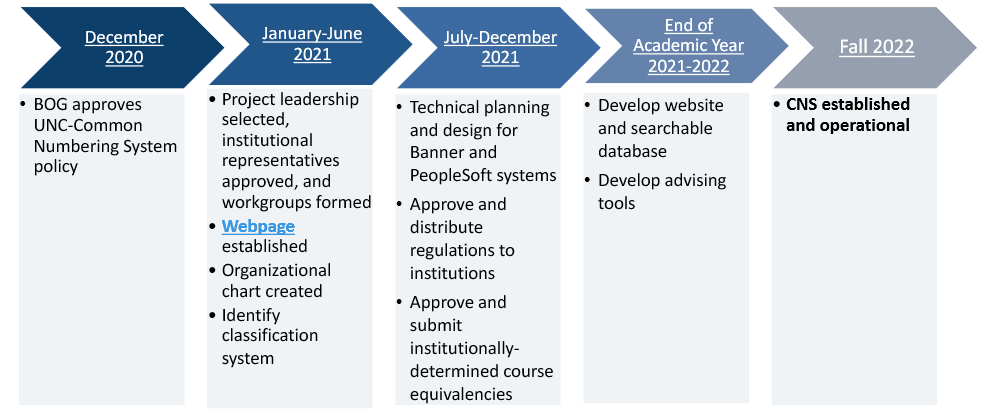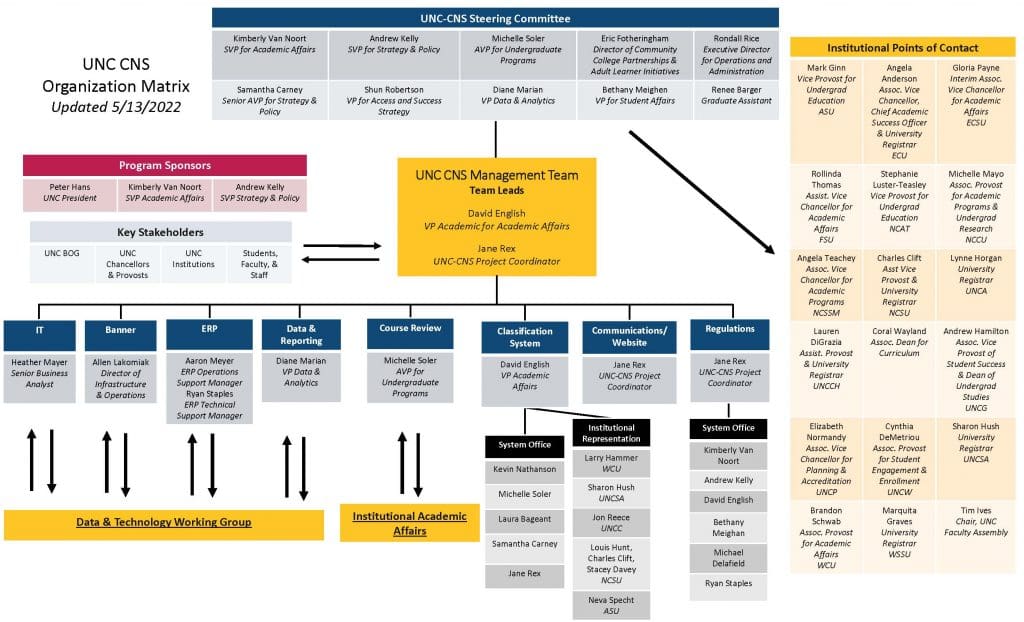At its December 17, 2020 meeting, the UNC Board of Governors approved the following amendment to UNC Policy 400.1.5 Policy on Fostering Undergraduate Student Success:
The UNC System Office shall, in consultation with faculty and staff from the constituent institutions, establish and maintain a common course numbering system for undergraduate lower division courses, which shall be mapped to the unique course numbers used at each respective institution of higher education. The president shall approve regulations to describe and implement this common undergraduate course numbering system, which shall be established and operational by the 2022-23 academic year.
In collaboration with institutional faculty, staff, and administration, the UNC System Office has begun the work of identifying and developing a set of course equivalencies for commonly taught, lower-division courses. Many equivalencies already exist, particularly for those courses designated in the Comprehensive Articulation Agreement (CAA) that governs transfer from NC community colleges. This work will also be focused on transfer credit among UNC universities.
The project will culminate in several tools and services made available to students, advisors, registrars, etc., that clearly indicate accepted transfer courses. To meet the intent of the policy, we will initially develop a searchable database that will be housed on the UNC System website and available to institutional websites. Eventually, migration into the Student Information System on each campus will enable automated assignment of transfer.
To guide this work, content experts from across the UNC System and chancellor-appointed points of contact are meeting regularly to identify the path forward that will establish a system of course equivalencies to improve awarding of transfer credit and overall transfer student success.
Regular updates will be made available here and to leadership across the UNC System.
Policy and REGULATION
Operations Manual
Updates
UNC-CNS TIMELINE

UNC-CNS ORGANIZATION CHART

CAMPUS POINT OF CONTACTS
| Institution | Name | Title | |
| Appalachian | Mark Ginn | Vice Provost for Undergraduate Education | ginnmc@appstate.edu |
| East Carolina | Angela Anderson | Vice Provost for Academic Success | andersona@ecu.edu |
| Elizabeth City | Gloria Payne | Interim Associate Vice Chancellor for Academic Affairs | gepayne@ecsu.edu |
| Fayetteville State | Rollinda Thomas | Assistant Vice Chancellor for Academic Affairs | rthomas8@uncfsu.edu |
| NC A&T State | Stephanie Luster-Teasley | Interim Vice Provost for Undergraduate Education | luster@ncat.edu |
| NC Central | Michelle Mayo | Associate Provost for Academic Programs and Undergrad Research | mlmayo@nccu.edu |
| NC School of Science and Mathematics | Angela Teachey | Associate Vice Chancellor for Academic Programs | teachey@ncssm.edu |
| NC State | Charles Clift | Sr. Vice Provost for Enrollment Management and Services | ceclift@ncsu.edu |
| UNC Asheville | Lynne Horgan | University Registrar | lhorgan@unca.edu |
| UNC Chapel Hill | Lauren DiGrazia | Assistant Provost and University Registrar | lmdig@email.unc.edu |
| UNC Charlotte | Coral Wayland | Associate Dean for Undergraduate Education | cwayland@uncc.edu |
| UNC Greensboro | Andrew Hamilton | Associate Vice Provost of Student Success and Dean of Undergraduate Studies | a_hamilt@uncg.edu |
| UNC Pembroke | Elizabeth Normandy | Associate Vice Chancellor for Planning and Accreditation | elizabeth.normandy@uncp.edu; polina.chemishanova@uncp.edu |
| UNC Wilmington | Paul Townsend | Associate Vice Chancellor and Dean of Undergraduate Studies | townendp@uncw.edu |
| UNC School of the Arts | Sharon Hush | Interim University Registrar | hushs@uncsa.edu |
| Western Carolina | Brandon Schwab | Associate Provost for Academic Affairs | beschwab@email.wcu.edu |
| Winston-Salem State | Marquita Graves | University Registrar | gravesmj@wssu.edu |
| Faculty Assembly | Tim Ives | Chair, UNC Faculty Assembly | timothy_ives@med.unc.edu |
UNC-CNS Frequently Asked Questions
What is the Common Numbering System (CNS)?
In December of 2020, the UNC Board of Governors approved the Common Numbering System (CNS) as an amendment to UNC Policy 400.1.5 Policy on Fostering Undergraduate Student Success to establish and maintain a common numbering system specifically identifying lower division courses most often used in transfer between the UNC institutions of higher education. The CNS is a special group of courses assigned a common number that have direct equivalency at all UNC System institutions that offer the course.
Why is CNS Important?
The CNS will allow for more seamless transfer of course credit between UNC institutions and limit the number of excess credits that transfer students earn, saving time and money.
How were courses selected to be included in the CNS List?
The most often transferred lower division courses between UNC System institutions were chosen to be included in Phase 1 of the CNS project. These courses were reviewed, revised and approved by faculty at each institution for bi-directional transfer.
Where can I find the CNS equivalencies?
Visit the Transfer Student Resources website to search for CNS equivalencies (CNS courses are denoted by a green check mark) or click here to download the full list.
Will non-CNS courses transfer?
Yes. The searchable database includes course equivalencies between UNC System institutions and North Carolina Community Colleges. The North Carolina School of Science and Math course equivalencies will be available Fall 2023.
Note: The following disclaimers are posted on the Course Transfer Search page:
- Course equivalencies on this list are for information purposes only. It is your responsibility to contact the institution that you plan to transfer to. The transfer institution can confirm course equivalency and how/if the course(s) will transfer into your intended major as well as provide information about other institutional transfer policies. Most institutions require a grade of “C” or better to transfer.
- Courses with lectures and labs may transfer differently depending on the number of credit hours for the course, whether the lecture and lab are combined as one course, and the policies of the receiving institution.
- Some courses may not transfer if the credit hours from the home institution are less than the transfer institution. Check with your transfer institution if you have any questions.
- Courses taken as a part of an articulation agreement may only transfer if the associate degree is awarded.
Are general electives included in the CNS?
Only courses that transfer as direct equivalents are included in the CNS. Depending on a student’s major and institution some CNS courses may be considered electives.
Will colleges and universities have to change their course catalog numbering?
No, the advantage of the UNC CNS is that institutions will retain their course prefixes, numbers, and titles. Institutional courses will be mapped to an overarching UNC System numbering system, which will help to identify how a course transfers.
When will the UNC CNS be available?
Phase I of the UNC CNS project is complete. The searchable database and transfer resources are available on the Transfer Student Resources website.
Updated 9/14/2022